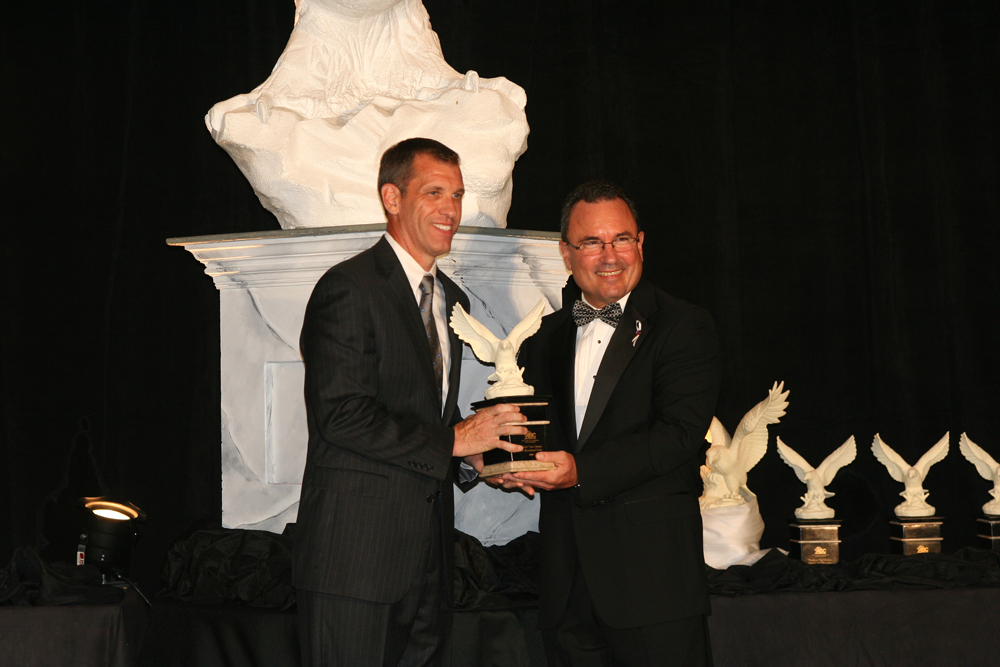Stellar, an architecture, engineering, construction and mechanical services firm, has won four Excellence in Construction awards from the Florida First Coast Chapter of the Associated Builders and Contractors (ABC).
ABC's Excellence In Construction program is the industry’s leading award competition, recognizing outstanding construction projects in a variety of categories. Evaluation criteria include personnel management, quality control, scheduling, value analysis, obstacles overcome in the course of the project, and more.
Winners were recognized August 10 at an awards celebration at the Omni Hotel Jacksonville on the Riverwalk. All four of Stellar’s nominations won awards. The winning projects are:
Joint Base Myer-Henderson Hall
Stellar completed design and construction of the 65,000-sf addition and renovation to the Marine Corps Exchange (MCX) at Joint Base Myer-Henderson Hall in Alexandria, Virginia. The MCX, a general merchandise retail store, remained open for business throughout construction. Extensive subsurface foundations and underpinning for existing structures immediately adjacent to the project further challenged the construction sequencing. Stellar began work in April 2010 and completed the project October 2011.
Leilehua Golf Course
Serving as design-builder, Stellar renovated Leilehua Golf Course, a military-owned public course on the Hawaiian Island of Oahu. The project brought the nearly 70-year-old course up to United States Golf Association standards. The course is now being hailed as one of the military’s top courses worldwide. Construction began January 2011 and was complete March 2012.
St. Mark’s Episcopal Church and Day School
Stellar provided pre-construction and construction management services for the renovation and expansion of St. Mark’s Episcopal Church and Day School. The project united the school campus and church campus, previously divided by Oxford Avenue, and included creation of a new campus green; addition and renovation of the 1968 vintage chapel; a new 10,000-sf commons building; and 7,400-sf of new covered walkways and a drop-off pavilion. Construction began June 2011 and was complete May 2012.
Warrior Zone
Stellar provided architectural, engineering and construction services for a state-of-the-art recreational center called the Warrior Zone, located at Joint Base Lewis-McChord near Tacoma, Washington. Construction began on the 29,000-sf building in September 2010 and was complete October 2011. Stellar worked with the military’s Morale, Welfare, & Recreation branch to help develop the concept for this high-tech facility. In additional to a theatre, restaurant, and billiards, entertainment includes online games played individually or remotely with others using Alienware computers. +
Related Stories
Museums | Aug 11, 2010
Design guidelines for museums, archives, and art storage facilities
This column diagnoses the three most common moisture challenges with museums, archives, and art storage facilities and provides design guidance on how to avoid them.
| Aug 11, 2010
Broadway-style theater headed to Kentucky
One of Kentucky's largest performing arts venues should open in 2011—that's when construction is expected to wrap up on Eastern Kentucky University's Business & Technology Center for Performing Arts. The 93,000-sf Broadway-caliber theater will seat 2,000 audience members and have a 60×24-foot stage proscenium and a fly loft.
| Aug 11, 2010
Citizenship building in Texas targets LEED Silver
The Department of Homeland Security's new U.S. Citizenship and Immigration Services facility in Irving, Texas, was designed by 4240 Architecture and developed by JDL Castle Corporation. The focal point of the two-story, 56,000-sf building is the double-height, glass-walled Ceremony Room where new citizens take the oath.
| Aug 11, 2010
Carpenters' union helping build its own headquarters
The New England Regional Council of Carpenters headquarters in Dorchester, Mass., is taking shape within a 1940s industrial building. The Building Team of ADD Inc., RDK Engineers, Suffolk Construction, and the carpenters' Joint Apprenticeship Training Committee, is giving the old facility a modern makeover by converting the existing two-story structure into a three-story, 75,000-sf, LEED-certif...
| Aug 11, 2010
Utah research facility reflects Native American architecture
A $130 million research facility is being built at University of Utah's Salt Lake City campus. The James L. Sorenson Molecular Biotechnology Building—a USTAR Innovation Center—is being designed by the Atlanta office of Lord Aeck & Sargent, in association with Salt-Lake City-based Architectural Nexus.
| Aug 11, 2010
San Bernardino health center doubles in size
Temecula, Calif.-based EDGE was awarded the contract for California State University San Bernardino's health center renovation and expansion. The two-phase, $4 million project was designed by RSK Associates, San Francisco, and includes an 11,000-sf, tilt-up concrete expansion—which doubles the size of the facility—and site and infrastructure work.
| Aug 11, 2010
Goettsch Partners wins design competition for Soochow Securities HQ in China
Chicago-based Goettsch Partners has been selected to design the Soochow Securities Headquarters, the new office and stock exchange building for Soochow Securities Co. Ltd. The 21-story, 441,300-sf project includes 344,400 sf of office space, an 86,100-sf stock exchange, classrooms, and underground parking.
| Aug 11, 2010
New hospital expands Idaho healthcare options
Ascension Group Architects, Arlington, Texas, is designing a $150 million replacement hospital for Portneuf Medical Center in Pocatello, Idaho. An existing facility will be renovated as part of the project. The new six-story, 320-000-sf complex will house 187 beds, along with an intensive care unit, a cardiovascular care unit, pediatrics, psychiatry, surgical suites, rehabilitation clinic, and ...
| Aug 11, 2010
Colonnade fixes setback problem in Brooklyn condo project
The New York firm Scarano Architects was brought in by the developers of Olive Park condominiums in the Williamsburg section of Brooklyn to bring the facility up to code after frame out was completed. The architects designed colonnades along the building's perimeter to create the 15-foot setback required by the New York City Planning Commission.








